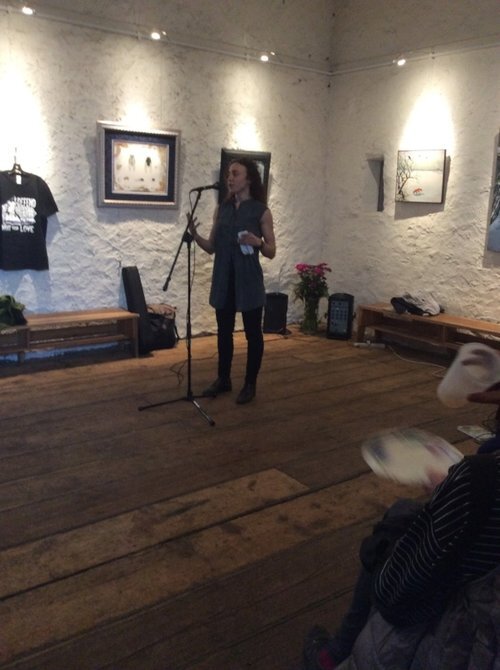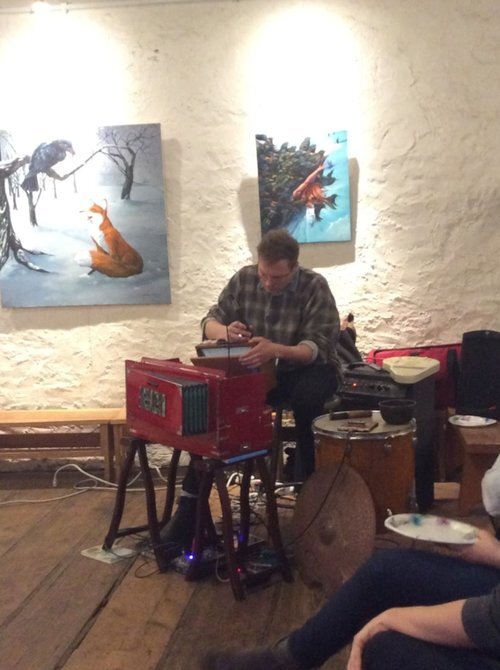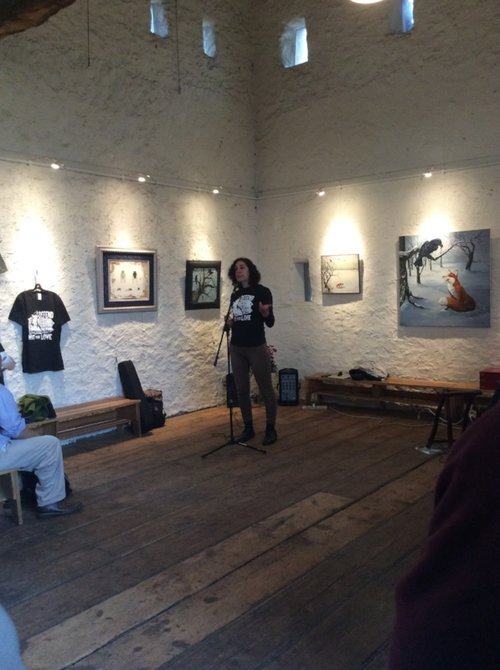In Pennsylvania, Resistance Grows to Proposed Sunoco Pipeline
After a drizzly week, Philadelphia’s weather granted residents and visitors an idyllic day on April 26, aligning with a gathering of dozens of community members at Bartram's Garden to raise funds for Camp White Pine, an anti-pipeline encampment in central Pennsylvania. The camp’s primary target is the Mariner East 2 pipeline, a project gaining notoriety for abuse of eminent domain and militarized expansion in a region particularly vulnerable to explosions and community displacement caused by oil and gas industry buildout. When asked, guests offered a variety of reasons for being there. Some came to support a friend providing music for the event. Others were drawn to the local fight by interest in the topic sparked in recent months by the indigenous-led battle against the Dakota Access Pipeline. Some were members or close supporters of EDGE Philly, the organization hosting the benefit.
The sliding scale donation at the door covered drinks, hors d’oeuvres and live music, including alternatively rousing and haunting a cappella performances by the Philadelphia Women's Slavic Ensemble and ambient electro-acoustic solo artist Tristan Dahn. For sale at the event were a variety of items such as jewelry, stationery, patches and t-shirts designed by EDGE member and artist Meg Lemieur, featuring a roaring bear and trees in the shape of Pennsylvania with the slogan “Defend What You Love.”
(L) Ray, a member of Camp White Pine. (C) Musician Tristan Dahn performs. (R) Coryn Wolk, EDGE Philly.
Speakers included EDGE member Coryn Wolk, and an update from Camp White Pine was provided by organizer and supporter Ray. “I first want to acknowledge that we are currently standing on occupied Lenni Lenape territory. I find that that's a very important thing to acknowledge, because for one, there's no justice on stolen land, and two, as folks who are actively organizing resistance to defend land, we have to acknowledge that people were here before us, that extraction and the expansion of the fossil fuel industry is a continuation of colonization, and that also we can't be fighting for private property rights. That's still part of the problem,” said Ray. A zine, An Incomplete Indigenous History of the Susquehanna Valley, was available for guests to inform themselves on the topics of local colonization and imperialism.
Coryn Wolk, no stranger to the pipeline fight, provided some historical context. “I've been working on Mariner East in various capacity since around 2014. It was actually announced late 2013 but now it's becoming a big news story because Sunoco is trying to finally push construction on it,” said Wolk in her opening comments to the crowd. “It started out in 1930 when Sunoco built an oil pipeline running east to west across Pennsylvania. That was a public utility, as it was bringing oil for people in Pennsylvania. Fast forward to 2013 and Sunoco has decided that they want to build a natural gas pipeline carrying fracked gas to Marcus Hook, which is just out of Philly, for export.
“So obviously this is not a public utility, it's not serving Pennsylvanians; Pennsylvanians' needs are already met for what gas it is carrying, and because once upon a time Sunoco was carrying oil for public use, they have a certificate of public utility status for this pipeline. So because of that, they decided that not only could they repurpose that 80-year-old pipeline, they could build pretty much as many more as they wanted, based on this status.”
Wolk continued, “So the Pennsylvania Public Utility Commission, they've kind of said ‘We're not dealing with that,’ and unfortunately, Pennsylvania's court system is not the most just. A lot of Pennsylvanian courts have been taking them at their word. So Sunoco's been using this status to seize people's land from Ohio, where the pipeline begins, across Pennsylvania, and people really haven't had any recourse. So people are intimidated by the companies, and those who fight back, such as the Gerhart family, often face severe repercussions.”
Recently, more repercussions have landed on the family, who were served only days before the fundraiser with a writ of possession by their sheriff’s department. “Sunoco Logistics applied for this writ and the court granted it. [The writ] allows Sunoco the same access to the easement where the pipeline is to be built, but it increases the consequences for the Gerharts if they resist it,” Ray explained. In other words, the main change resulting from this development is harsher legal consequences for fighting the pipeline. “It's not surprising that the courts granted this. It means that Sunoco doesn't just want people to be arrested if they're blocking construction of the pipeline, they want them to be punished, and they want to make a huge deal out of it.”
This is, unfortunately, only a continuation of the horrors the Gerhart family, who founded the encampment, have faced since being forcefully brought into the narrative. “Two years ago was when Sunoco Logistics approached the Gerharts and offered them money for access to the woods behind their home to build this pipeline,” said Ray. “They have been resisting since then, resisting eminent domain proceedings, and a year ago, a year after that, even without all the permits that Sunoco needed to start building the pipeline, they sent in tree clearing crews to start clearing the trees. This is a classic move by the oil and gas companies, they do as much as they can to almost literally pave the way for construction even if they don't have all the rights yet. They just ease it through.”
The family has more reason for this fight than just an interest in protecting private property. “The Gerharts have about 70 acres of pristine woodlands that they live on,” explained Wolk. “They actually entered into an agreement over 20 years ago to preserve the woods on their property, and because of that and because they don't want to sell off the land for any amount of money, they said no. Since saying no, the mother of the family, Ellen Gerhart, a retired special education teacher, has been arrested three times. Elise, her daughter, has been arrested as well, and faced charges for actions on the pipeline. Sunoco has been closing in from both sides.”
Fortunately, the Gerharts and their supporters were prepared to put up a fight, or more accurately, to put up a tree sit. “For folks who don't know what a tree sit is, it's kind of a low budget treehouse that people get into to hopefully keep tree clearing crews from knocking down the trees that are connected to the tree sit,” Ray explained. “This tree sit was erected and tree clearing crews continued to clear trees within the right of way, but were not able to clear these trees. While this was happening, two supporters and Elise's mother were arrested. Some of the bails were set at $100,000 and $200,000.” A startled audience member shrieked in response.
“Yeah, pretty ridiculous, right?” Ray agreed. “It makes it very clear that it's very political how the law is being set in places where extraction is happening. Luckily those bails were reduced and people were able to get out. The sit persisted for two weeks, which is great, but unfortunately Elise, who lives there, was taken down from the sit and arrested. But those trees that were part of the sit are still alive. And that's where we stand today. That's Camp White Pine, and the tree sits that are currently going on.”
Needless to say, the camp falls into the category of “resistance camps.” However, there are important distinctions to make between similar sites of action, such as the now iconic Standing Rock reservation in Lakota territory. “I want to make it clear that this is very different because it's not indigenous-led,” said Ray, referring to Camp White Pine. “The stakes are very different. Our resistance is very different. But it's resistance nonetheless, and it’s not a one-off thing. For the last several years, people have been resisting pipelines and fracking doing road blockades, tree sits, through encampments, it's an ongoing process that's been escalating along with the fossil fuel escalation.”
Escalation is certainly not a foreign concept to the Gerhart family and supporters in the camp. “Sunoco has been getting its name smeared because of Standing Rock, and it's evil, and it deserves to have its name smeared, but it definitely wants to be making examples out of people, and wants to send people to jail for a really long time, which may happen, and that's part of why we need money. People are going to be arrested, it's almost a guarantee. They're going to have to go through pretty extensive legal proceedings, and that costs money. People will spend time in jail and that also costs money, to support them in it,” continued Ray, explaining why the fundraiser was necessary.
“We’re not doing resistance in a way that is easy for the nonprofit industrial complex to give us a whole bunch of money. We're being confrontational, not passive. It's hard to get money through the grant system, through which a lot of other organizations are able to get money. So that's why we're having to do events like this, or have bluegrass shows in the townie bar, or sell t-shirts and patches. In Philly there are a lot of resources, and it's really important that we share these resources with more rural people in rural places where they just don't exist. Central Pennsylvania is far away from everything. There's nothing around. And people don't have money. Anyone who is from rural Pennsylvania and has been fighting fracking knows that people out there don't get support for the work they do. Not from other states, not from a lot of nonprofits here in the state, it's just nonexistent while people are fighting for their lives.”
But despite a general lack of attention and resources, action camps have been powerfully effective in numerous ways. Camp White Pine seeks not only to draw attention to the construction and resistance to the Mariner East 2 pipeline, it also creates a physical barrier to expansion of the project, and an environment where skills for resistance can be shared among seasoned and new members of political and environmental movements. These are things that not every well-intentioned political demonstration can accomplish.
“Resistance doesn't happen in a day. It doesn't happen in a couple days. It doesn't happen on the weekend when you get off of work. It's definitely not going to happen by caravanning to DC on a Saturday when nobody is there, especially the President, who will actually be in Harrisburg, celebrating his 100 days,” said Ray in reference to the upcoming People’s Climate March. “The resistance has to be part of our lives. It needs to happen every day and be ongoing. That's how trust is built. That's how we're going to win.”
To donate to the Gerhart family, please visit: https://www.resistsunocopa.com/
To order “Defend What You Love” t-shirts to benefit Camp White Pine, please visit: https://www.etsy.com/shop/StopSunocoPA/
To donate to EDGE or to become involved, visit http://www.edgephilly.org/
Sarita Farnelli is a Philadelphia-based writer and organizer, covering grassroots movements and arts and entertainment. She can be found on Twitter at @sarita_ebooks.




